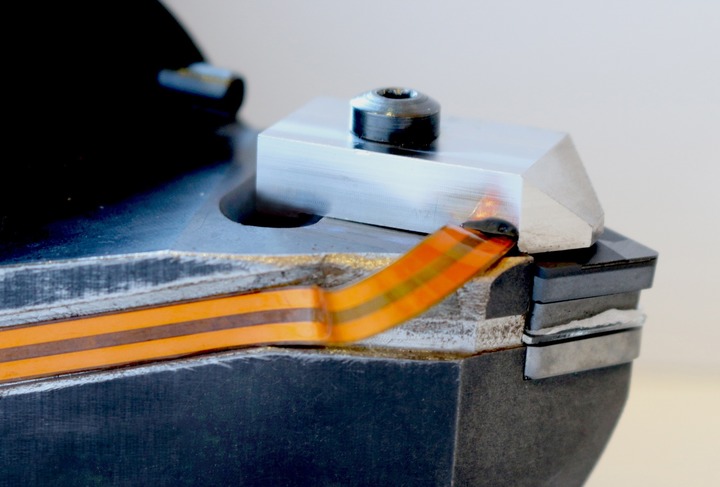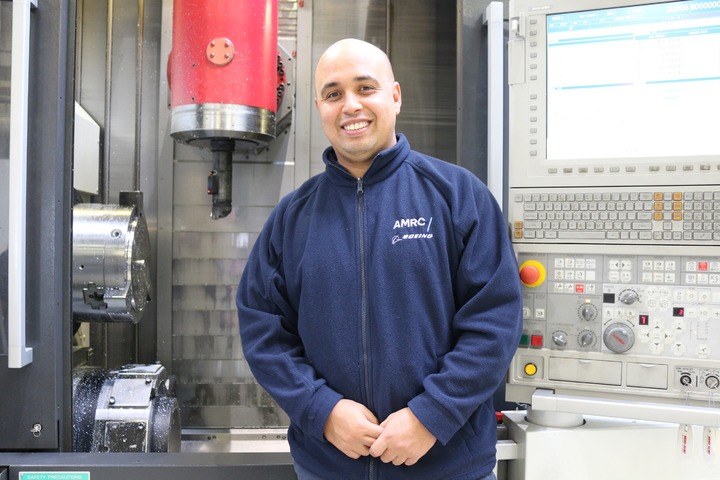Low cost sensors have high impact on productivity
30 January 2019An intelligent, low-cost tooling insert, embedded with smart sensors, has been developed to deliver in-process condition monitoring that reduces machining stoppages and improves productivity for UK manufacturers.
The prototype device, developed with Innovate UK funding, allows a machine tool operator to determine the condition of a cutting tool without manual inspection and is the first ‘plug and play’ system of its kind with no process learning time required on installation.
“Currently, the task of monitoring the wear on the tool cutting edges is carried out by an operator who inspects the cutting tool using a laser or touch probe system; thus causing stoppages of machine tools which results in poor productivity and potentially higher costs,” said AMRC Machining Group Technical Lead for Control Systems, Sensors and Data Acquisition, Hatim Laalej who has been working on the development of the device. “These are real concerns for manufacturers as stoppage costs in production can be high.
“Manual inspection also varies according to the skills and experience of the operator monitoring the tool wear. When tools are not changed at the right time, damage can be caused to a work piece, leading to increased costs due to scrappages and rework. Equally, if tools are changed before the end of their useful life this can increase consumable costs.
“The cost of the system is relatively low as it involves using low-cost electronics. The device has been designed to be accessible to small and medium sized companies who are looking for ways to improve the efficiency, performance and quality of their operations, which is vital to improving the productivity of the wider UK economy.”

“The sensor monitors the resistance generated within the tool-embedded-sensor, so if its resistance increases this indicates tool wear, chipping or breakage.” said Hatim. “This means errors can be recorded and operators can move to preventative maintenance planning to free up valuable time on the shop floor when operators could utilise extra capabilities increasing productivity.”
The AMRC Machining Group successfully installed the prototype on its DMG Mori NT5400 DCG five-axis turning machine, to trial cutting operations and validate its capabilities.
The cutting operations were simulated before trialling the prototype on the DMG, where Polycrystalline diamond and Polycrystalline cubic boron nitride cutting inserts with embedded sensors were used to machine Titanium Ti-6AI-4V and Inconel 718 bars respectively.
But Hatim is not resting on his laurels. His goal is to eliminate tool wear, machine downtime and eventually tool breakage altogether: “Further development of the technology will look at extending the process for various milling processes as well as turning and adapt the system to send diagnosis and data to a portable device, such as a laptop, so an operator can be working remotely to the machine.”
The Innovate UK project was a collaboration between fellow High Value Manufacturing Catapult partner CPI, alongside Element Six, Advanced Manufacturing (Sheffield) Limited, BAE Systems, Printed Electronics Ltd, National Physical Laboratory and DMG MORI UK and the resulting prototype device is now ready to be scaled up into an industry-ready solution.
The AMRC is keen for partners, especially tool-holding manufacturers, who might be interested in developing the prototype as a commercially available product, as the new system will have massive benefits for machinists in all manufacturing sectors.


